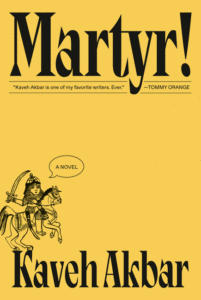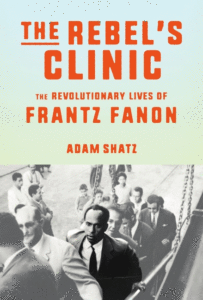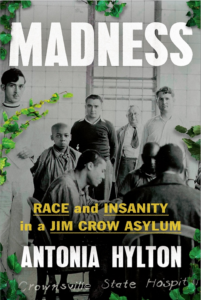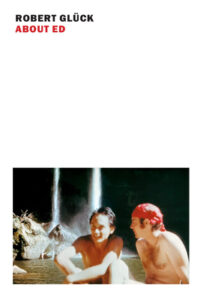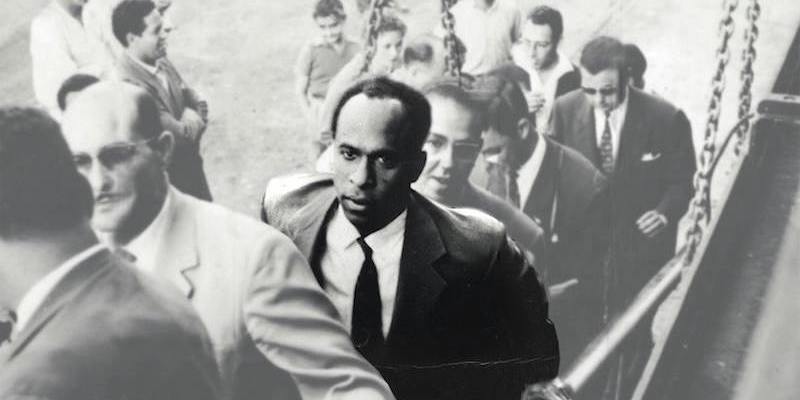
5 Book Reviews You Need to Read This Week
“The ingenious doctor and impassioned activist was every bit as much a victim of empire as the patients he worked to heal.”
Our basket of brilliant reviews this week includes Sarah Cypher on Kaveh Akbar’s Martyr!, Menachem Kaiser on József Debreczeni’s Cold Crematorium, Becca Rothfeld on Adam Shatz’s The Rebel’s Clinic, and Daniel Felsenthal on Robert Glück’s About Ed.
Brought to you by Book Marks, Lit Hub’s home for book reviews.
*
“Shame-ridden Shams is the sun around which Martyr! moves. The writing evokes shades of Denis Johnson—in the gutted, elegiac quality of Train Dreams but also flashes of the hapless antihero of ‘Emergency.’ It is sumptuous with metaphors, at their best when animating Cyrus’s childhood … With a kaleidoscope of perspectives that illuminate almost 40 years of history, the battlefields of the Iran-Iraq War and dreamlike scenes outside of time, the novel is obsessed with how ‘meaningless’ individual suffering can become legible ‘at the level of empire,’ asking what turns a death into a martyrdom. With its scope, intense interest in the limits of language and self-aware narrative strategy, Martyr! has both focus and heft. Yet it is also unpretentiously veined with the language of sacred and poetic texts, and is studded with new poetry from Akbar writing as Cyrus …
In the hands of a lesser writer with an agenda, this material could be esoteric and tedious, but Akbar’s narrative maintains a glorious sense of whimsy: In one chapter, the ghost of Cyrus’s mother speaks with Lisa Simpson; later, a Trumpian buffoon attempts to complete a gory transaction for the Mona Lisa in a mall … Sensual, oneiric and wonderfully strange, Akbar intuits the mind’s talent for distilling meaning from the surreal. His fiction taps his expertise in conjuring an experiential purity—through metaphor and with humor that lands. He invites the reader to embrace the kind of queer sense-making that finds no answers yet rests, as Cyrus says, with, ‘All I know is I’m fascinated.’”
–Sarah Cypher on Kaveh Akbar’s Martyr! (The Washington Post)

“The details are so precise that any critical distance collapses—nothing’s expected, nothing’s dulled by cliché. It is as immediate a confrontation of the horrors of the camps as I’ve ever encountered. It’s also a subtle if startling meditation on what it is to attempt to confront those horrors with words. What Debreczeni experiences is so cartoonishly cruel that it defies not description but moral comprehension. ‘Horror is always kitsch,’ he writes after an ad hoc execution, ‘even when it’s real’ …
The book’s final third—in which Debreczeni has been assigned to the “cold crematorium,” a place where inmates too sick to work are left to die—is especially staggering…Debreczeni has preserved a panoptic depiction of hell, at once personal, communal and atmospheric. Occasionally shifting tenses or even assuming omniscience, he floats among the nearly dead and the newly dead, crafting a kind of in-progress collective obituary, sketching the human beings they once were, the human lives they once had, as their corpses are carried out and flung into a lime pit … The finest examples of Holocaust literature—and Cold Crematorium is so fine it transcends its category—aren’t merely bulwarks against obscurity; they do more than allow us to never forget. They offer a glimpse, one that is unyielding and unsoftened by sentimentality, one that is brutally, unbearably close.”
–Menachem Kaiser on József Debreczeni’s Cold Crematorium: Reporting From the Land of Auschwitz (The New York Times Book Review)
“A biography of the psychiatrist, philosopher and revolutionary Frantz Fanon is, inevitably, a biography of the world he fought to change. Fanon would no doubt have approved: As a pioneer of ‘social therapy,’ an approach that classified personal pathologies as political symptoms, he understood better than anyone that individuals are unintelligible in isolation. The maladies he treated as the director of a mental hospital in colonial Algeria, where he worked on the eve of the country’s fight for independence in the 1950s, were to him inextricable from the deadliest illness of all: the epidemic of French imperialism.
A biography of Fanon is also of necessity a biography of his legend, which sometimes deviates considerably from his person. His support for the Algerian struggle was unwavering, and he is often remembered as a militant who once lauded anti-colonial violence as ‘cleansing force.’ But as the critic and essayist Adam Shatz demonstrates in his nimble and engrossing new book, The Rebel’s Clinic, Fanon was never as one-dimensionally bellicose as he is often taken to be, not only by his enemies but by his allies and hagiographers … As Shatz shows in this exemplary work of public intellectualism, in which he does not sugarcoat or simplify, the ingenious doctor and impassioned activist was every bit as much a victim of empire as the patients he worked to heal.”
–Becca Rothfeld on Adam Shatz’s The Rebel’s Clinic: The Revolutionary Lives of Frantz Fanon (The Washington Post)
“The United States has a long and troubled history of manipulating psychology to control Black Americans, quell resistance, rationalize unpaid labor and justify cruelty. At the depths of chattel slavery, white physicians argued that Black people were immune to mental illness, kept emotionally healthy by the kindness of their enslavers and the fresh air and exercise provided by working in the fields. As growing numbers of enslaved people attempted to escape, this itself was classified as a mental illness, ‘drapetomania.’ Dr. Samuel Cartwright, a Southern ‘expert’ in Negro medicine, prescribed one of the cures as ‘whipping the devil out of them.’ In the decades following the prohibition of slavery, the United States found another way to use psychology to control Black Americans—and squeeze out more free labor. As detailed in the journalist Antonia Hylton’s fascinating Madness, the ‘feeble-minded’ Blacks were rounded up and placed in asylums where they were put to work as indentured servants …
Madness, though ostensibly the story of Crownsville, is really about the continued lack of understanding, treatment and care of the mental health of a people, Black people, who need it most. Near the end of her book, Hylton invokes the 2023 story of Jordan Neely. In visible distress and screaming that he was hungry, he was thrown to the floor of the New York subway by a former Marine who locked him in a chokehold and killed him. ‘I thought of Maynard when The New York Post labeled Jordan Neely “unhinged” and a “vagrant” and wrote about him as though he had been the villain in the story of his own public killing,’ Hylton notes. Though both Foster and Neely were in need of treatment, care, support and kindness, she adds, they ‘were met with almost anything but.’”
–Linda Villarosa on Antonia Hylton’s Madness: Race and Insanity in a Jim Crow Asylum (The New York Times Book Review)
“Glück is a self-professed slow writer, but he was also delayed by the burden of his book’s content—the subject was his first real boyfriend, and he had to sift through the intricacies of mourning and mortality…Time enabled him to create something uncommon and powerful. About Ed is a literary monument that harnesses memoir’s emotional honesty while indulging fiction’s stylistic latitude … The book’s subject is not only Ed but also his generation of gay men, many of whom lost their lives to AIDS. In Glück’s hands, memorializing becomes a defiant celebration of sex. Few writers have approached this task with his shameless feeling—Glück is one of the best around at portraying the mysteries of the flesh, and in About Ed, as in his previous novels, his amatory writing is magnificently precise …
The New Narrative encourages active self-questioning on the page, and Glück operates beautifully in this tradition, reconsidering and amending his recollections from the vantage of age. About Ed revisits the past through moments that he can neither forget nor firmly grasp … The parts of Ed that are barred to Bob are the core of the book’s sadness and mystery. Glück often slips into poetic spacing when integrating Ed’s prose, reminding us of the contrivance of appropriation. We’re always aware of the author’s hand, assembling and editing Ed’s words, and thus of the hard limits of our ability to inhabit and connect with Ed directly. The book makes us question whether human beings in general resist the complete soul-merging that Bob seeks through romantic sex and appropriative writing.”
–Daniel Felsenthal on Robert Glück’s About Ed (The New Yorker)
Book Marks
Visit Book Marks, Lit Hub's home for book reviews, at https://bookmarks.reviews/ or on social media at @bookmarksreads.










